#identify disorder
Text
June Darby

By day works as a Nurse saving lives with the medical profession. But at night she fights as the huntress, only she has no idea of her other alter ego. How can she balance her of being a single parent, her job when she doesn’t even know who she truly is?
June Darby was one of the victims after the invasion battle forces of Apokalypse. Attempting to keep the injured in a stable condition while avoiding harm from the para-demons monster attacks, the female nurse was captured and put into slave camps on earth. Only to escape from the environment with the Justice League and New Gods of Neo-Genesis uniting pushing the forces away.
The woman was returned back to her life or so she thought. In actuality June was never the same at least not to her knowledge the next few months, she would wake up with bruises and sores she never had before. Her doctors say nothing but in reality the medical professional had developed a slip personality disorder (D.I.D). To protect herself from all the painful trauma she endured.
The Huntress
As the huntress the heroine alter ego is completely different from June warmth and caring nature. Huntress lives up to her name as a hunter with no limit. Once she’s got her mark she never stops, Huntress searches relentlessly for the earth collaborates of the hellish world Apokalypse so, that they may pay for all the pain they’ve done to their people.
However, Huntress’s greatest weakness is herself as she does everything in her power to keep June from uncovering her other identity. Out of fear the weak nurse will keep Huntress from proceeding in her mission of vengeance.
(Update link below.)
#newpostup❤#superhero#art#dc fanart#illustration#june darby#huntress#dc huntress#au universe#transformers au#dc universe#the owl house#the owl house au#dc apocalypse#justice league#identify disorder
8 notes
·
View notes
Text
I actually find it really bizarre and counter intuitive that clinically speaking, you cannot legally be diagnosed with a personality disorder until you're at least 18. The reason given for this is because "the personality has not fully developed before this age" like ???
Ah yes, my favorite strategy. Not diagnosing the problem until it's already been virtually cemented into your brain for life! Wouldn't it be easier (and more painless) to address the problem before it's fully developed?
#im also certain that the age that personality fully forms at is not a universally agreed upon number#like idk. maybe this raises less questions about age and more about the potential consequences of pathologizing personalities#it feels a little fucked up to me that some mental illness are 'just' mental illnesses while others are deemed a thing synonymous with you#and i can understand if some people with personality disorders do really heavily identify with their disorders#thats fine!#i also think the average person has a concept of personality which is relatively stagnant and thats just not realistic tbh#i mean if you think personality is stagnant then yours probably is so in rhat sense youre not wrong#but personality can absolutely change and i dont think it makes you a 'different person'#i think its a natural progression#anyways. got a little derailed but the point im trying to make is#lets find a way to give people with personality disorders a more realistic hope for recovery without invalidating them#and also lets maybe try to treat personality disorders preemptively so they don't get worse
224 notes
·
View notes
Text
Ok it's a matter of well established fact that Cats are Autistic,
but now I submit to you this incomplete list of equally Neurodivergent animals:
Dogs (ADHD)
Opossums (AuDHD)
Foxes (BPD)
Raccoons (PDA & OCD)
I will not absolutely elaborate
Dogs: Heavily affected by their emotional state, especially WRT perceived rejection. Difficulty switching tasks once they've become invested. Difficulty controlling where their focus goes, but Very Good at focusing.
Possums: Frequently misunderstood and misidentified by people who don't really know what they're looking at.
Foxes: Depicted as wily and unpredictable. Capable of great wisdom or great mischief. Often alone, but actually quite social for the right people.
Raccoons: Very invested in their rituals. Curious and capable, but not at your command. Often stereotyped as only caring about crime and cleanliness.
#shitpost#shitposting#cats are autistic#neurodivergent#neurodivergent memes#actually autistic#ADHD#bpd#ocd#pda#AuDHD#bpd means borderline personality disorder just to be perfectly clear#this is just a shitpost#obviously not all neurodivergents of any given dx will identify with these animals
332 notes
·
View notes
Text
STRAY
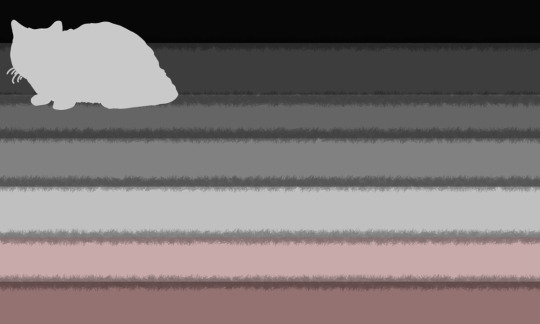


- : an identifier for people who are seen as “dirty”, “diseased”, “disgusting”, etc., due to their PD . . .
- : anyone with ANY PD can use this term ! transabled people fuck off ur gross.

- : flag and term coined by me . . . give credit if reposted . . .

#disorder requests#lgbtq requests#mogai coining#mogai flag#mogai gender#mogai requests#mogai safe#system requests#xeno coining#xenogender coining#identifiers#identifier flag#PD identifier#loverdiseased
119 notes
·
View notes
Text
It’s easy for people to criticize protectors for how we react to perceived threats —
Some of us get defensive, some of us get loud, or completely freeze up, or run for safety, or suddenly collapse and can’t move, or become mute, or have extreme fawn reactions … and to the outside, it seems over the top.
Or maybe you think it’s not fair that we saw you as a threat because you got angry and yelled. Maybe you think it’s childish that we sprinted out of the house or scary that we kicked into “fight” mode.
We had to identify threats fast. We had to do what it took to survive. To protect our system and our physical body and mind.
And we can and should learn to react more proportionally. But our instincts aren’t ridiculous or made to victimize you. They made sense in the traumatic environment that created us. They’re the only reason we’re still here now.
We still fall back on that because it worked and we survived.
#actually did#actually dissociative#osddid#sysblr#dissociative identity disorder#did system#actually osdd#sbc system tag: thorn 🥀#I am the ‘angry’ protector#I’ve been learning how to handle conflict better#I know I can’t just flip out on people#I know trauma isn’t an excuse#for losing control#but right now#someone is mad at me#for identifying their behavior as threatening#and removing myself from the situation#because I knew I was triggered#and I couldn’t control my response#so I left#and then tried to talk about my concerns later#and this person#is PISSED#purely because#I was seeing red flags#and even though I stepped away and left the room#they’re upset that I was triggered by them#I’ve seen people get upset#when Casper or Lyka run away and hide#saying it’s childish
33 notes
·
View notes
Note
wait are you anti endo :((
i had to look up this word to make sure i knew what you meant because for some reason i mixed this up with emeto and thought you were asking me if i was anti vomiting??? 😭
anyway no
#i was like 'is this about an eating disorder??'#but anyway#tbh i dont really care about the origins of anyones weird mental shit#being a fakeclaimer is like the dumbest thing in the world like who cares if someone fakes a disorder. get a hobby bro#if someone is genuinely spreading bad shit abt a disorder you have i can understand rbing to correct them but#everyone experiences shit differently so accusing someone of faking just because they dont seem disabled how you want them to be is dumb af#me personally i dont need 'proof' of anyones identifying of anything. if you want to be treated a certain way well#i am capable of being decent and respecting other peoples wishes and boundaries. its that simple 🤷♂️#should i tag this as discourse or something. idk. ask to tag ig?#syscourse
49 notes
·
View notes
Text
Ok but like how do you all come up with system names? Because I’ve never seen a system name that wasn’t cool as fuck. Feel free to reply/reblog with your system name!
#Jay speaks#not a system myself but this is an observation I’ve had ok#they’re all so cool?? did it come naturally to you or did it take time?? tell meeee#idk if it’s the equivalent of being trans or what but that’s the like the only reference I have??#it took me FOREVER to come up with a name lmao#dissociative identity disorder#osdd#ossd system#did system#uhhh idk how to tag this cause I don’t want to go into personal spaces?? I guess it could just be for my followers tho??#let me know if there are better tags! esp for those systems that don’t identify or like medicalizatiob#*medicalization#<<- I spelled that wrong four times jfc
227 notes
·
View notes
Text
It’s official- I am the Hulk! Why? Because last night I got so overwhelmed I turned into another person.
DID joke
#did#actually did#did system#dissocative identify disorder#dissociative system#dissociative alters#dissociative identities#dissociative identity disorder#overwhelmed#coping#incredible hulk#hulk#hulkout
52 notes
·
View notes
Note
Genuine question, what’s wrong with the DSM?
[OP refers to the Diagnostic and Statistical Manual of Mental Disorders, which I mentioned being unpopular among mental health professionals.] Disclaimer: I'm not a psychiatrist, I'm not a therapist, and I'm not trained in counseling. I'm a social psychology researcher. If a therapist contradicts me, listen to the therapist.
The problem with the DSM as I understand it: a lot of counselors/ psychiatrists/ etc. want to move away from a category- and source-based diagnostic system, toward a symptom-based treatment system. For example, think about Pepto Bismol: you feel nauseous, you chew pink tablets, it ends your nausea. It doesn't matter if your nausea is indigestion or seasickness or lactose intolerance. You match a treatment (pink bismuth) to a symptom (nausea) and don't waste time or money on diagnosis unless that treatment proves ineffective.
A large percent of counselors etc. would like to take the same approach to mental health. So we'd be researching treatments for nightmares (neurofeedback? MDMA?) in the long-term, and giving clients treatments for nightmares (meditation! Ambien!) in the short-term. All without worrying too much about whether the nightmares are caused by General Anxiety Disorder or a phobia or Seasonal Affective Disorder. There are many strengths to that approach.
Only, see, there's this big purple dinosaur holding us back.
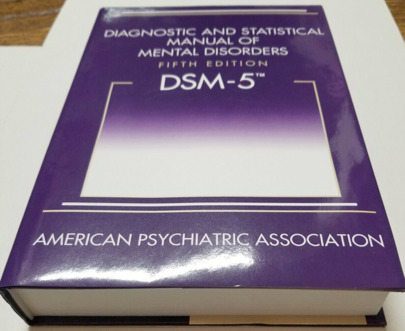
[Image ID: Hardcover copy of the Diagnostic and Statistical Manual of Mental Disorders, Fifth Edition, DSM-5, American Psychiatric Association; the title is white text on a purple background.]
So if everyone who uses the DSM also hates the DSM, why does it still exist and why do we keep buying it every time a $100 text revision gets published? Two reasons, in order of importance:
Insurance
Communication
Insurance is, I kid you not, the DSM's #1 reason for existence. American insurance companies won't cover treatment unless it's for a diagnosed illness, and so therapists put diagnosed illnesses on what they'd often be more comfortable describing as "bro, this dude is hella distressed and I'm trying to help undistress him." Note the word American on the cover; other countries have other manuals, and no other country's counselors are as chained to theirs as we are to ours. This means that the DSM helps — yay, affordable therapy! It means the DSM hurts — sets of symptoms get grouped artificially, spectra get split into categories, and diagnosis happens way too early in the therapeutic process.
Another comparison to unmental health: I don't have carpal tunnel syndrome, but my insurance provider thinks I do. I only announce that I don't because I haven't told you who I am or where I live. (If the insurance companies find us... Well, we just won't let them find us. The thing you should know is everyone is getting screwed by health insurance. Yeah, even you.) I have wrist pain and tingling. It has the wrong antecedents for carpal tunnel, and it has weird manifestations — pressure on the base of my thumb causes pain in my pinky — but my OT wrote down "Carpal Tunnel" on the forms because the alternative was a $500+ round of diagnostic scans. No one cares whether my median nerve is inflamed or not; occupational therapy still looks like "try this stretch, that stretch, this brace, that brace, and these activity changes; keep whichever combination makes the pain and tingling go away."
This kind of thing also happens in mental health all the time. Many therapists don't care — and neither should you — if your serotonin levels are low; if you're miserable and an SSRI prevents the misery, take the dang SSRI. If your mother was harshly critical and now you feel panic at any hint of criticism, it doesn't matter whether that better fits C-PTSD or NPD; it matters whether you cope with soothing self-talk or if you cope with alcohol. Put something from the DSM on the forms, and focus on finding which stretches (breathing exercises) make the tingling (panic) go away.
Communication is the biggest strength of the DSM. It means that clients can benefit from labels ("I'm not lazy, I'm ADHD") and consistent standards of treatment can be applied across different clients in different states. The DSM has huge lists of things like "if your client shows memory problems, be sure to check for alcohol abuse" or "if they have self-harm, make sure it's non-suicidal before you do anything else" that are tremendously helpful. It can help therapists who encounter a set of behaviors they've never seen before to go "client is rigid, rule-bound, and lacks insight... huh, looks like I'd better refer them to an OCPD specialist." (It's also the source of a lot of toxic misinformation on social media when symptom lists get taken out of context without that all-important differential diagnosis information, but I digress.)
However, diagnosis should never be the beginning point for therapy — it's impossible to know your client's mind without first building trust and transference — but reliance on the DSM for insurance often forces it to be. Diagnosis should never be the end point for therapy — knowing your perceptions don't match others' because of Bipolar I won't stop you hearing the dang hallucinations — but home use of the DSM often acts that way. Categorical diagnosis is limiting if your therapist is primarily interested in how depressed you are but the Beck Depression Inventory uses an absolute cutoff point for "depressed" or "non-depressed." Categorical diagnosis is useless if over 50% of people diagnosed with a depression are later diagnosed with an anxiety disorder, and vice versa. So it's an imperfect book that does a lot of things well and a few things badly, and many of its heaviest users would argue that it shouldn't exist at all.
For further reading, I recommend The Body Keeps the Score by Bessel van der Kolk. I don't agree with all the axes he grinds or all the ways he grinds them, but he's got decades of psychiatry experience and is (I hope) predicting the next paradigm shift in mental health.
For instance, van der Kolk argues that it doesn't matter if at intake your client has long blond hair and is named Linda, only to show up the next time with no hair and the name Gerald, only to come next time with short red hair and the name Taylor. The therapist should only be asking "how does the client feel about these changes?" and "what are these changes doing for the client?" If Linda can't remember what Gerald did, then focus on the terrible memory gaps that alter identities create. If Taylor became Gerald to try and please you, then focus on teaching mindfulness and self-compassion. If this is a happily genderqueer person, then figure out why they're seeking help and don't worry about the appearance changes. If this is someone who thinks in absolutes and regards their personality as constantly changing, then work on teaching them to see the world and themself with moral complexity. It doesn't matter whether Dissociative Identity Disorder exists or not; just ask your client what they need and how you can help, then go from there.
Anyway, the DSM is an imperfect solution to a complex problem, and a lot of mental health practitioners view it as a relic of a more paternalizing era. No one has come up with a really good solution for how to remove and replace it, so for now it's the least-bad option.
#dsm#dsm 5#psychology#psychological research#therapy#counseling#mental health#diagnostic and statistical manual of mental disorders#psychiatry#diagnosis#long post#(almost) nothing to do with animorphs#depression mention#ptsd mention#suicide mention#american politics#to be 100% clear: I *do not know enough* to have an opinion about whether or not Dissociative Identity Disorder exists#i only know that some very expert people have argued for it *and* that some very expert people have argued against it#and that all these very expert people absolutely agree on listening to the client howsoever the client chooses to identify#more research is needed#I reiterate: I AM NOT A THERAPIST AND NONE OF THIS IS MEANT AS MENTAL HEALTH ADVICE
594 notes
·
View notes
Note
Questioning NPD culture is thinking "Man I feel like i'm faking it." and panicking slightly because what if you were faking some shit for attention and you aren't actually as egodivergent as you thought you were.
.
#if you feel the need of attention in the first place imo it's already closer to actual npd on its own than not/hj lh#but yeah. honestly? idgaf if someone fakes a disorder for attention. disorders are stigmatized to begin with#fakers dont claim any advantages by identifying as a disorder just like people not faking dont have advantages either#if something as a label doesnt fit right for you. faking it would make you feel odd and uncomfortable in the long run anyway.#just be yourself and trust your own experiences about your identity before textbook definitions.#dont be afraid to label yourself wrong#it's part of the self discovery journey/gen srs pos#npd culture is#questioning npd culture is#ask#asks#fnuuyfrogman76#q#npd#npd safe#actually narcissistic#narcissistic personality disorder#actually npd#narcissism#narcissistic#narcissist#actually cluster b#cluster b safe#cluster b#cluster b personality disorder
19 notes
·
View notes
Text
Too many "Steve's looking at Eddie's lips because he wants to kiss him" posts and not enough "Steve Harrington needs to lip read or he has even less of an idea of whats going on" posts!!!
#let Steve be HoH and/or auditory processing disorder representation pls and thank u#i mean he obviously wants to kiss eddie but thats besides the point#disability rep in media means a lot to me#i personally identify with the APD side of this rep but HoH rep is rly cool too!!!!!!#stranger things headcanon#stranger things#stranger things 4#stranger things 4 spoilers#stranger things spoilers#steve harrington#eddie munson#steddie
440 notes
·
View notes
Text

#kirby#daily kirby#my art#digital#hal laboratory#nintendo#turns out our new laundry detergent was making me very nauseous the past couple days yaaaay#I love having an immune disorder it's not Total Nonsense Misery at all! :)#(it is. I'm being sarcastic. it sucks.)#(even other people with fragrance sensitivities and stuff usually get wheezy or itchy! but no! it made me nauseous!)#(which makes it harder to identify!)#(and I gotta rewash my most recent loads of laundry once my wife buys more unscented detergent!)#(and maybe have her smell test to figure out what needs to be washed)#(it was specifically a shirt that got washed a week ago and was folded up in a drawer)#(but still smelled So Strongly that I could taste it when I first put it on.)#favorites
92 notes
·
View notes
Text
BUTCH CUB
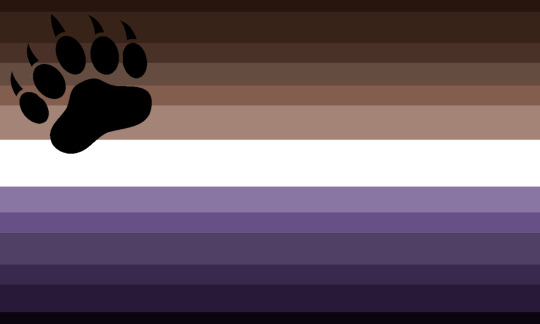
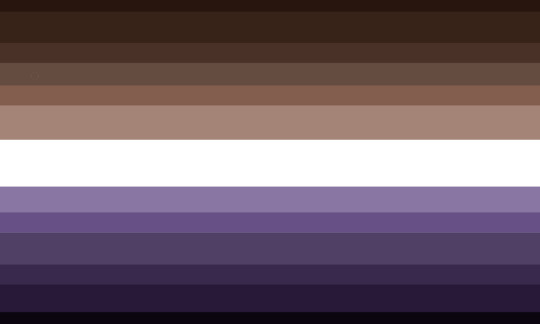
- : when you’re a butch who is also a cub! . . . requested by anon . . .

- : original made by @caeliangel here! . . . give credit if reposted . . .
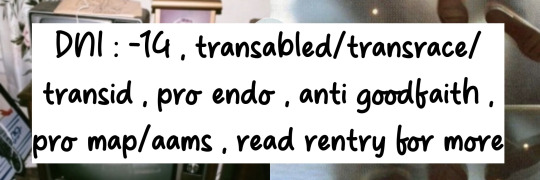
#disorder requests#lgbtq requests#mogai coining#mogai flag#mogai gender#mogai requests#mogai safe#system requests#xeno coining#xenogender coining#cub flag#butch flag#butch cub#cub butch#identifier flag#cannifreak flags
12 notes
·
View notes
Text
for anon asking about NPD/ASPD resources
For context, anon sent in an ask searching for nonstigmatizing resources for support with PD diagnoses and other stigmatized diagnoses.
And this is such a good ask--it is so fucking frustrating and dehumanizing to try to search for support when half the stuff that pops up is using really cruel language or just directed towards family and friends. The community definitely deserves better, both when it comes to the way psych professionals perpetuate stigma and in regards to the prejudice and sanism that shows up in other communities in our lives. Unfortunately, I don't have a ton of resources on hand, although I do know one good support group. The rest of the resources I know of are kind of mediocre or not PD specific, so if other people could add on I would really, really appreciate it!
Neuromancers runs a discord and a Cluster B peer support group that I've heard really good things about. I haven't been myself, so I can't 100 % vouch, but they're a group with abolitionist and mad pride values.
This might not be exactly what you're looking for, but it's an article exploring cultural bias in PD diagnosis that links to a lot of sources that talk about how psychiatry contributes to stigma around personality disorders. I clicked through some of the studies that it links to and it does use a lot of medicalized language, but I thought I would link the article anyway in case it's ever helpful to have academic sources to show to other people.
Also not exactly what you're looking for, but another article debunking some of the common talking points about NPD in pop psychology (Content warning that it is discussing some very ableist myths in the context of challenging them)
Last sort of general resources for peer support that I have some trust that they are PD friendly are the Wildflower Alliance and Hearing Voices Network Groups. Wildflower alliance groups offer a lot of different general peer support and I have one friend with NPD who has spoken positively of those spaces. Hearing Voices Network groups can vary a lot depending on location, so defintely plan to email ahead, but I've been to a few groups that welcome people who generally identify as psych survivors/mad/ex patients who want to share community spaces around those values. Also want to share is the neurodivergent friendly workbook of DBT skills (the link is to buy it directly from the creator but if anyone who is interested can't afford it rn, dm me and I'll send you a pdf.) Again, I know this is really not super relevant to what you asked for but is one of the less stigmatizing, less medicalizing workbooks I can find for accessing info about coping skills and this is one of my general favorite support resources.
Overall I'm really sorry that I don't have better resources to offer you, and I think that really should be a sign to the mad pride/psych abolition/peer support community that we need to do a lot better job in making sure that our spaces are explicitly welcome to people with stigmatized PD diagnoses. The work shouldn't have to be on you to try to navigate these spaces and figure out whether or not you're welcome, and any spaces that offer peer support, are aligned with mad pride and psych abolition, really should be doing the work to make sure lateral violence and sanism aren't being perpetuated.
followers, esp followers with lived experience, please add on!
#antipsych#psych abolition#mad studies#mad pride#cluster b#npd#aspd#spent a bit of time looking through my clinical databases as well but could not easily find any articles#that weren't fucking awful#also to clarify: i have lived experience being diagnosed with a cluster b personality disorder#but don't currently identify with that diagnosis or really interact in a lot of pd specific spaces or know#tons about what community preferences and community consensus on things r#so this is def something where i would love input from people with relevant lived experience!
101 notes
·
View notes
Text
Bro ☠️ Its been a hot minute since Ive hoarded the dominant brain and Im just like god ☠️ Anyways hi 👋
We just were like "Ya know Riku dominant brain is keeping us overloaded with all their options give me dominance here so I can set a clear plan" and god its nice to be back as a mostly independent part right now. Been like a fucking like three months?
I do find it really funny cause as a fused whole for like three months where there was literally no point in identifying a primary speaker, we were kinda wondering if we could still genuinely pick a specific hat to wear and sit as that part with limited dissociation and at this point we were chatting and as a whole were like
"Yeah the Riku brain sees too many good options and is getting overwhelmed with choice paralysis and making us anxious, I think we need a moment for XIV brain to set the plan and make the decisions so we know what the hell we are doing"
And so we are like aight, transfering most cognitive control to XIV brain and...
Im like lmao ☠️ How quickly I go back to being me and speaking like me its funny as shit ngl
We didn't split btw like, we are still technically a fused whole, just Riku brain swapped with me in brain dominance cause that part wasnt working as well to navigating and planning life and shit.
#alter: xiv#dissociative identity disorder#actuallydid#shitpost#sup and hello 👋#its been like three months since there was genuinely anything worth identifying and its a nice break
10 notes
·
View notes
Text
hm. i always thought my gender didnt really mean that much to me but i think not being able to be a gender freak at work might possibly be affecting my mental health perhaps maybe
#mmmmmmm#i dont know if im just bored or experiencing dysphoria :(#guy who has 'cant identify his own emotions' disorder :(((#need to get my therapist on the horn about it tbh#terrifiedofjudgement
8 notes
·
View notes